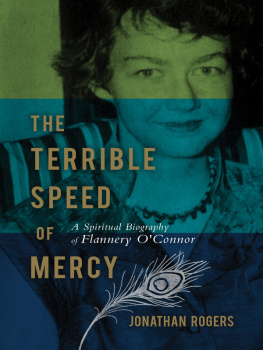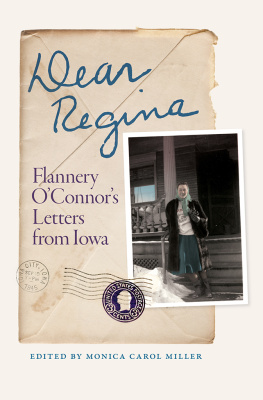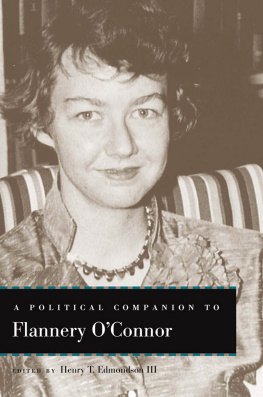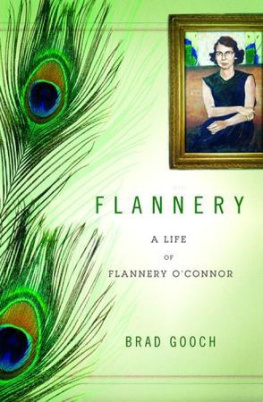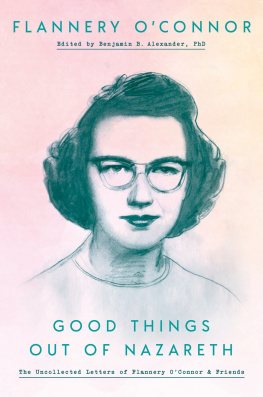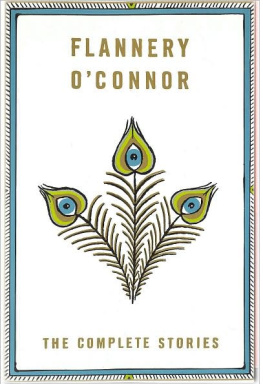Creating Flannery OConnor
Creating Flannery OConnor
Her Critics, Her Publishers, Her Readers

DANIEL MORAN

2016 by the University of Georgia Press
Athens, Georgia 30602
www.ugapress.org
All rights reserved
Set in Adobe Caslon Pro by Graphic Composition, Inc., Bogart, GA
Printed and bound by Thomson-Shore
The paper in this book meets the guidelines for permanence and durability of the Committee on Production Guidelines for Book Longevity of the Council on Library Resources.
Most University of Georgia Press titles are available from popular e-book vendors.
Printed in the United States of America
16 17 18 19 20 c 5 4 3 2 1
Library of Congress Cataloging-in-Publication Data
Names: Moran, Daniel, 1968 author.
Title: Creating Flannery OConnor : her critics, her publishers, her readers / Daniel Moran.
Description: Athens : The University of Georgia Press, 2016. | Includes bibliographical references and index.
Identifiers: LCCN 2015043074| ISBN 9780820349541 (hardcover : alk. paper) | ISBN 9780820349558 (ebook)
Subjects: LCSH: OConnor, FlanneryCriticism and interpretation
History. |OConnor, FlanneryReligion. | OConnor, FlanneryRelations with publishers. | Literature publishingUnited StatesHistory20th century. | Authors and publishersUnited StatesHistory20th century. | Authors and readersUnited StatesHistory20th century. Classification: LCC PS3565.C57 Z789 2016 | DDC 813/ .54dc23 LC record available at http://lccn.loc.gov/2015043074
Contents
ONE
The Two Receptions of Wise Blood
TWO
The Discovery of OConnors Catholicism
THREE
OConnors Posthumous Reputation
FOUR
Robert Giroux, Sally Fitzgerald, and The Habit of Being
FIVE
Adaptation and Reputation
SIX
OConnor and the Common (Online) Reader
Acknowledgments
It has become a clich to state in such pages, This work could not have been possible without the support of many people, but this may be one clich a reader may forgive, since its true. James L. W. West III, John Francis X. Judge, Roxanna Bikadoroff, Georgia Newman, Peter B. Hirtle, and Janice T. Pilch shared their insights and offered advice on subjects both aesthetic and legal. Karin Coonrod, Alfred Corn, Wally Lamb, Mary Jo Bang, Julia Whitworth, and Marilyn Nelson all kindly spoke to me about OConnors induction into the American Poets Corner. Gordon Thomas and Marshall Bruce Gentry, both of Georgia College, answered all my queries with the enthusiasm one would expect from fellow admirers of OConnor.
The staff of the Manuscripts and Archives Division of the New York Public Library made the imposing task of sifting through hundreds of documents manageable and enjoyable, as did their colleagues at the New York Public Library for the Performing Arts. Victoria Fox at Farrar, Straus and Giroux was patient and invaluable in helping me obtain the necessary permissions.
At the University of Georgia Press, Walter Biggins believed in the project from the beginning and responded to my many emails throughout the writing and preparation of the book; Beth Snead and John Joerschke helped get the manuscript in its present form. Daniel Simon provided expert copyediting. Kevin Mulchahey at the Rutgers University Library provided invaluable help with locating sources and tracking down stray reviews of OConnors work as I delved more deeply into the topic. Elizabeth Teets of the Weinberg Memorial Library at the University of Scranton helped me locate an original copy of Esprit that celebrated OConnor soon after her death. Barry Qualls of Rutgers University provided helpful comments about the book after its first draft was completed; his good humor and kindness will not be forgotten. And Father Robert Lynam of St. Augustine of Canterbury Church provoked me, long before I began this work and to the present day, into thinking more deeply about Catholicism; while we have never talked about OConnor, his ideas have helped me better grasp her attitudes and themes.
Four extraordinary teachers deserve mention. Ronald Christ provided the kind of sharp feedback I first found when I was a student in his undergraduate classes many years ago. I am grateful for his honesty and insight. Robert Weisbuch taught me to think more clearly and deeply about Melville, which, in turn, helped me think more deeply about OConnor, one of his literary descendants. Jonathan Rose first introduced me to the subject of book history and oversaw an earlier version of this work when he served as my dissertation director at Drew University. His enthusiasm, characterized by his ending many emails with the affirming command Onward!, meant a great deal to me and still does. Finally, I am forever indebted to William Vesterman, who provided good sense, conversation, and support throughout the writing of this book and throughout my adult reading life. It is no exaggeration to say that he taught me how to read critically when I entered his classroom many years ago at Rutgers; his friendship and approach to literature have made me a better reader, writer, and thinker than I ever would have been had we never met.
A second staple of acknowledgment pages is that the authors family is thanked last. But how could things be otherwise? My childrens support of my work was constant and appreciated; their sense of humor always prevented me from taking myself too seriously, and I am grateful to them in ways they will not understand until they are older. My wife, Deirdre, supported this work from its beginning and motivated me to stick with it, especially on those days when I came home from the library empty-handed or with only a few sentences added to the whole. She, as Wordsworth wrote, has had no slight or trivial influence / On that best portion of a good mans life. And while OConnor reminds us that a good man is hard to find, I know that Deirdre has made me at least a better one, and it is to her that I dedicate this work.
Permissions
For permission to quote archival material, I thank Hualing Nieh Engle, Caroline Gordon Wood Fallon, and Dr. Robert E. Lee.
Dale Franciss August 12, 1955, letter to the editors of Commonweal and the unsigned review of A Good Man Is Hard to Find of February 22, 1957, are reprinted with the permission of Commonweal, 1955, 1957.
Quotations from unpublished letters by Regina OConnor and Elizabeth McKee are reprinted by permission of the Mary Flannery OConnor Charitable Trust via Harold Matson Company, Inc. 1970, 1972 Elizabeth McKee, 1976, 1977 Regina OConnor. All rights reserved.
Excerpts from unpublished letters to various recipients and correspondence written by Robert Giroux from 1963 to 1990 are copyright 2016 by Farrar, Straus and Giroux, LLC. Printed by permission of Farrar, Straus and Giroux, LLC.
Quotations from unpublished letters by Robert Fitzgerald and Sally Fitzgerald are reprinted by permission of Ughetta Lubin Fitzgerald, on behalf of the children of Robert and Sally Fitzgerald.
Introduction
Stamp of Approval
In May 2015 the United States Postal Service announced that the image of Flannery OConnor would grace an upcoming ninety-three-cent stamp. OConnors admirers were understandably pleased that she would join the likes of Hawthorne, Faulkner, Hurston, and the twenty-seven other authors in the USPSs Literary Arts series. She may not have reached the heights of the Forever stamp status, a distinction held by only Mark Twain and O. Henry, but at least she had been admitted to the pantheon. In his gracious and appreciative speech at the unveiling that June, Bruce Gentry, editor of the
Next page

